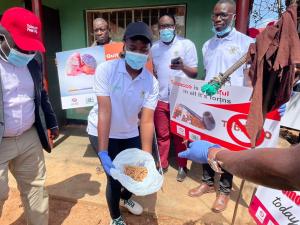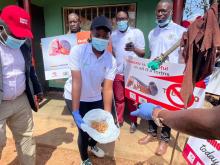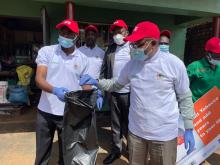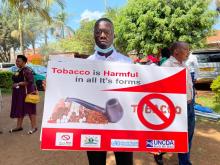Over 4,750,000 Community Members in Uganda Sensitized on The Negative Impacts of Tobacco Consumption on Health and The Environment
The Ministry of Health in Uganda, the World Health Organization (WHO), and members of the Civil Society conducted a series of activities in Entebbe municipality in Uganda to commemorate World No Tobacco Day 2022 under the theme “Protect the Environment”.
Activities included awareness-raising among over 4,750,000 community members on the negative impact of tobacco on health and the environment; Cleaning up tobacco Cigarette butts in the Entebbe market and Mass screening for some diseases caused by Tobacco, including diabetes and high blood pressure.
During the community outreach session, the guest of honor, Dr. Charles Olaro, the Director of Health Curative-Services at the Ministry of Health, called on the community to join the rest of the world in strengthening tobacco control efforts to prevent premature deaths and promote economic development through a healthier and more productive population.”
“For every cigarette smoked, resources which could be used for education, clothing, and feeding are wasted. Reducing tobacco consumption is important to achieving Sustainable Development Goals.” Dr. Olaro
Dr. Bayo Fatunmbi, the Team Lead for UHC – Communicable and Non-communicable Diseases at the WHO Country Office to Uganda, commended the efforts made so far on the reduction of tobacco consumption in Uganda as reported in the Tobacco Epidemic Report (2019).
The report revealed that Uganda achieved progressive implementation of interventions for tobacco control with monitoring at 70%, a ban on advertising, promotion, and sponsorship at 70%, and Smoke-Free Environment at 30%.
"Uganda already has developed some important instruments for the control of Tobacco Consumption. I encourage everyone to make good use of Uganda's Tobacco Control Act 15 and the WHO Framework Convention on Tobacco Control to end the tobacco pandemic." Dr. Fatunmbi.
In Kenya, a Tobacco-Free Farms project, coordinated by the World Health Organization and the Food Agriculture Organization (FAO) supports the government to enable farmers to plant alternative crops that contribute to improving food security and household incomes for these communities.
The tobacco epidemic is one of the greatest public health threats the world has ever faced. It kills more than 8 million people worldwide each year. More than 7 million of these deaths are the result of direct tobacco use, while about 1.2 million are the result of non-smokers' exposure to second-hand smoke.
In Uganda, the harmful impact of the tobacco industry on the environment and health is vast. Over 15% of boys and 13% of girls aged 13-15 years start smoking annually. It is estimated that tobacco kills 204 Ugandans weekly, which is more than HIV, tuberculosis, malaria, accidents, and crime put together.
Despite this high mortality rate, more than 1,020,500 men and 1 in 10 persons in Uganda smoke cigarettes daily, making it an ongoing and dire public health threat. The economic cost is also astronomical; with tobacco use accounting for an estimated USD 126 million in direct medical care for adults and indirect costs due to lost productivity as a result of premature mortality and morbidity.
Dr. Olaro stressed that to reduce the consumption of tobacco in the country, decision-makers should:
- Impose the Extended Producer Responsibility principle on the tobacco industry to hold them accountable for the cost of cleaning up tobacco product waste;
- Impose an environmental tax levy on tobacco manufacturers, distributors, and consumers
- Support policy actions to ban single-use plastics which include cigarette butts, smokeless tobacco pouches, and electronic waste;
- Advise farmers to switch to sustainable and environmentally friendly crops that provide a greater return on investment in terms of health and wealth.







